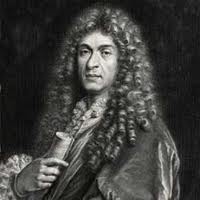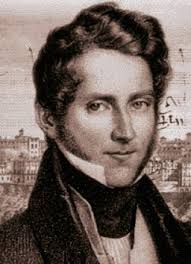November 25, 2013.Lully and Donizetti.Just a couple of weeks ago we wrote about François Couperin and Vincenzo Bellini and here we are, celebrating yet another of the French Baroque greats and a very important Italian composer of the bel canto.In our notes the French Baroque fared the best, as in the last couple of months we also wrote about Marc-Antoine Charpentierand Jean-Philippe Rameau.But at the beginning of it was the Italian, Jean-Baptiste Lully.Lully was born on November 28, 1632 in Florence and christened Giovanni Battista.He was brought to France at the age of 14 to serve at the court of Mademoiselle de Montpensier (la Grande Mademoiselle), the granddaughter of the King Henry IV and Marie do Medici.Mademoiselle, one of the richest women in France, was famous for her patronage of the arts and had many household musicians.Young Lully probably studied music with some of them.After Mademoiselle was exiled from the capital during the Fronde, Lully received her permission to return to Paris, where very soon he was hired as the violinist and composer at the court of Louis XIV.He stayed with the court for the rest of his life, although Louis’ affection cooled considerably after Lully was caught in a liaison with a male page.Highly ambitious, Lully sought titles and positions all his life.He held many royal appointments and even became a secrétaire du roi, usually reserved for the French nobility.He also bought a royal patent for operatic productions, and from 1674 no opera could be staged in France without his permission.
While engaged in the intrigue, he still managed to produce a huge volume of music.As long as the King was interested in dancing, it was mostly ballets (Lully himself was a very good dancer), but later he turned to opera or “tragedy set to music.”Lully introduced livelier dances to the ballets, got rid of “recitative secco” of the traditional Italian operas, in which declamation was accompanied only by the continuo, and adopted “accompagnato,” in which the orchestra is accompanying the singer.All these innovations made his music so much freer, both rhythmically and melodically.For a number of years Lully collaborated with Molière and wrote a number of “interludes” to his plays.He also composed some sacred music, six motets among them.The opera Alceste, ou Le triomphe d’Alcide was composed to celebrate the capture of Franche-Comté from Spain and premiered in 1674.Here is the Overture and several numbers from the first act of the opera.Jean-Claude Malgoire conducts his ensemble, La Grande Écurie et la Chambre du Roy.The mezzo-soprano Stéphanie d'Oustrac is the Nymphe of the Seine, the soprano Judith Gauthier is La Gloire.
Gaetano Donizetti was born on November 29, 1797 in Bergamo, Lombary.Born into a poor family, he received some musical education at Lezioni Caritatevoli, a school established in Bergamo by the German composer Simon Mayr.Mayr, a minor composer, authored 70 operas, which probably influenced Donizetti’s tastes in composing.The success came to Donizetti rather late: he was 33 when he wrote Anna Bolena; the opera was staged in Milan and made him instantly famous (the 1957 staging of the opera in La Scala was one of Maria Callas’ greatest triumphs).Two years later, in 1832, he composed L'elisir d'amore, a two-act comic opera.In 1835 he wrote his absolute masterpiece, Lucia di Lammermoor.The opera premiered at the Teatro San Carlo in Naples on September 26, 1835, three days after the death of Vincenzo Bellini.With Rossini in retirement, Donizetti was left the reigning master of the Italian opera.Lucia became his most famous opera, performed world over.In 1838 Donizetti moved to Paris, following the steps of Rossini and Bellini.There he wrote La fille du régiment, another comic opera and also a huge success.Unfortunately, just five years later he became sick, both physically (probably syphilis) and mentally.He was moved into an institution in Paris, where he was visited by friends, Giuseppe Verdi among them, and then taken back to his native town, Bergamo.He lived there with the family of Scotti (his wife and children had died years earlier).Donizetti died on April 8, 1848 at the age 50.Here is Lucia’s famous Mad Scene with Joan Sutherland in the live 1964 performance at the Metropolitan opera, Silvio Varviso conducting (we had to cut the ovation at the end of the recording).
Lully and Donizetti, 2013
November 25, 2013. Lully and Donizetti. Just a couple of weeks ago we wrote about François Couperin and Vincenzo Bellini and here we are, celebrating yet another of the French Baroque greats and a very important Italian composer of the bel canto. In our notes the French Baroque fared the best, as in the last couple of months we also wrote about Marc-Antoine Charpentier and Jean-Philippe Rameau. But at the beginning of it was the Italian, Jean-Baptiste Lully. Lully was born on November 28, 1632 in Florence and christened Giovanni Battista. He was brought to France at the age of 14 to serve at the court of Mademoiselle de Montpensier (la Grande Mademoiselle), the granddaughter of the King Henry IV and Marie do Medici. Mademoiselle, one of the richest women in France, was famous for her patronage of the arts and had many household musicians. Young Lully probably studied music with some of them. After Mademoiselle was exiled from the capital during the Fronde, Lully received her permission to return to Paris, where very soon he was hired as the violinist and composer at the court of Louis XIV. He stayed with the court for the rest of his life, although Louis’ affection cooled considerably after Lully was caught in a liaison with a male page. Highly ambitious, Lully sought titles and positions all his life. He held many royal appointments and even became a secrétaire du roi, usually reserved for the French nobility. He also bought a royal patent for operatic productions, and from 1674 no opera could be staged in France without his permission.
notes the French Baroque fared the best, as in the last couple of months we also wrote about Marc-Antoine Charpentier and Jean-Philippe Rameau. But at the beginning of it was the Italian, Jean-Baptiste Lully. Lully was born on November 28, 1632 in Florence and christened Giovanni Battista. He was brought to France at the age of 14 to serve at the court of Mademoiselle de Montpensier (la Grande Mademoiselle), the granddaughter of the King Henry IV and Marie do Medici. Mademoiselle, one of the richest women in France, was famous for her patronage of the arts and had many household musicians. Young Lully probably studied music with some of them. After Mademoiselle was exiled from the capital during the Fronde, Lully received her permission to return to Paris, where very soon he was hired as the violinist and composer at the court of Louis XIV. He stayed with the court for the rest of his life, although Louis’ affection cooled considerably after Lully was caught in a liaison with a male page. Highly ambitious, Lully sought titles and positions all his life. He held many royal appointments and even became a secrétaire du roi, usually reserved for the French nobility. He also bought a royal patent for operatic productions, and from 1674 no opera could be staged in France without his permission.
While engaged in the intrigue, he still managed to produce a huge volume of music. As long as the King was interested in dancing, it was mostly ballets (Lully himself was a very good dancer), but later he turned to opera or “tragedy set to music.” Lully introduced livelier dances to the ballets, got rid of “recitative secco” of the traditional Italian operas, in which declamation was accompanied only by the continuo, and adopted “accompagnato,” in which the orchestra is accompanying the singer. All these innovations made his music so much freer, both rhythmically and melodically. For a number of years Lully collaborated with Molière and wrote a number of “interludes” to his plays. He also composed some sacred music, six motets among them. The opera Alceste, ou Le triomphe d’Alcide was composed to celebrate the capture of Franche-Comté from Spain and premiered in 1674. Here is the Overture and several numbers from the first act of the opera. Jean-Claude Malgoire conducts his ensemble, La Grande Écurie et la Chambre du Roy. The mezzo-soprano Stéphanie d'Oustrac is the Nymphe of the Seine, the soprano Judith Gauthier is La Gloire.
Gaetano Donizetti was born on November 29, 1797 in Bergamo, Lombary. Born into a poor family, he received some musical education at Lezioni Caritatevoli, a school established in Bergamo by the German composer Simon Mayr. Mayr, a minor composer, authored 70 operas, which probably influenced Donizetti’s tastes in composing. The success came to Donizetti rather late: he was 33 when he wrote Anna Bolena; the opera was staged in Milan and made him instantly famous (the 1957 staging of the opera in La Scala was one of Maria Callas’ greatest triumphs). Two years later, in 1832, he composed L'elisir d'amore, a two-act comic opera. In 1835 he wrote his absolute masterpiece, Lucia di Lammermoor. The opera premiered at the Teatro San Carlo in Naples on September 26, 1835, three days after the death of Vincenzo Bellini. With Rossini in retirement, Donizetti was left the reigning master of the Italian opera. Lucia became his most famous opera, performed world over. In 1838 Donizetti moved to Paris, following the steps of Rossini and Bellini. There he wrote La fille du régiment, another comic opera and also a huge success. Unfortunately, just five years later he became sick, both physically (probably syphilis) and mentally. He was moved into an institution in Paris, where he was visited by friends, Giuseppe Verdi among them, and then taken back to his native town, Bergamo. He lived there with the family of Scotti (his wife and children had died years earlier). Donizetti died on April 8, 1848 at the age 50. Here is Lucia’s famous Mad Scene with Joan Sutherland in the live 1964 performance at the Metropolitan opera, Silvio Varviso conducting (we had to cut the ovation at the end of the recording).
was staged in Milan and made him instantly famous (the 1957 staging of the opera in La Scala was one of Maria Callas’ greatest triumphs). Two years later, in 1832, he composed L'elisir d'amore, a two-act comic opera. In 1835 he wrote his absolute masterpiece, Lucia di Lammermoor. The opera premiered at the Teatro San Carlo in Naples on September 26, 1835, three days after the death of Vincenzo Bellini. With Rossini in retirement, Donizetti was left the reigning master of the Italian opera. Lucia became his most famous opera, performed world over. In 1838 Donizetti moved to Paris, following the steps of Rossini and Bellini. There he wrote La fille du régiment, another comic opera and also a huge success. Unfortunately, just five years later he became sick, both physically (probably syphilis) and mentally. He was moved into an institution in Paris, where he was visited by friends, Giuseppe Verdi among them, and then taken back to his native town, Bergamo. He lived there with the family of Scotti (his wife and children had died years earlier). Donizetti died on April 8, 1848 at the age 50. Here is Lucia’s famous Mad Scene with Joan Sutherland in the live 1964 performance at the Metropolitan opera, Silvio Varviso conducting (we had to cut the ovation at the end of the recording).